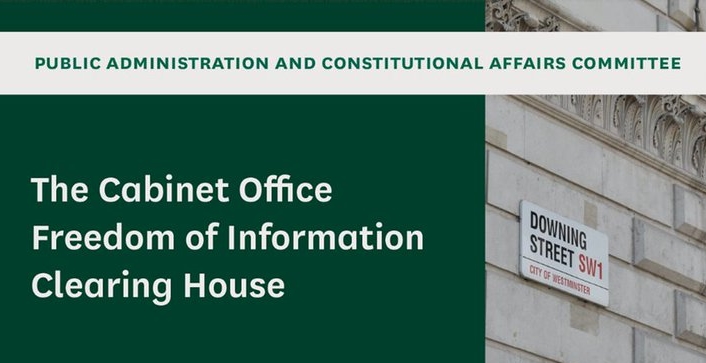
The Commons Public Administration Committee is calling for a ‘cultural shift’ across government, with ‘greater advocacy for the core principles’ of FOI and action to improve outcomes for FOI applicants.
In a new report which is highly critical of the Cabinet Office, the committee concludes: “The Cabinet Office needs to work harder to ensure a strong and enthusiastic tone from the top that supports FOI.”
The MPs also rebuke the Cabinet Office for a ‘lack of transparency’ on the workings of its FOI Clearing House, which advises other government departments on handling information requests. And they criticise the Cabinet Office’s refusal to allow an audit of its FOI operations by the Information Commissioner’s Office as ‘misjudged’.
The committee wants to see better timeliness in the freedom information process, through government conducting internal reviews of requests within the 20 days recommended in the Information Commissioner’s guidance.
These are some of the conclusions in the newly published report from the House of Commons Public Administration Committee after its inquiry into the Cabinet Office and FOI, focused around the controversial Clearing House unit.
The report also draws attention to evidence the committee received about ‘poor FOI administration in the Cabinet Office and across Government which appears to be inconsistent with the spirit and principles of the FOI Act’.
The committee chair and Conservative MP William Wragg said: “As FOI policy owner and coordinating department, the Cabinet Office should be championing transparency across government, but its substandard FOI handling and failure to provide basic information about the working of the coordinating body has had the opposite effect.”
The report contains some stinging rebukes for the Cabinet Office, saying that ‘transparency is needed to restore trust’. It calls for the quarterly publication of Clearing House casework data, broken down according to the referring department, and analysed for the timeliness of replies.
The committee’s MPs were clearly particularly annoyed by the fact that the Cabinet Office now releases less information about the casework of the Clearing House than was issued in the past by the Ministry of Justice when it had responsibility for FOI and the Clearing House.

The committee is also concerned about the overall approach of the government to openness. It is worried about ‘a slide away from transparency’ illustrated by the decision to exclude the new Advanced Research and Invention Agency from FOI. The MPs call on ministers to show proactive leadership on championing FOI and set a ‘stronger tone’ on promoting its benefits.
The MPs are unhappy about a split of responsibilities, in which the Cabinet Office oversees FOI policy but DCMS funds the ICO. They argue this should be resolved by either the Cabinet Office taking over the funding or DCMS being given charge of FOI policy.
The committee’s inquiry was prompted by a Tribunal case last year, arising from an FOI request made by Jenna Corderoy, a reporter for openDemocracy. This succeeded in revealing details about FOI requests passed to the Clearing House by other departments after much resistance from the government.
Last August the government said it would set up its own internal review of how the Clearing House functions. Nothing more happened until yesterday – funnily enough, the day just before the Commons committee report was to be published – when it revealed that this review will be led by Sue Langley, the lead non-executive director at the Home Office.
The government review will examine these questions:
● Is the role of the Clearing House proportionate and effective?
● Is there sufficient information available to the public about the operation of the Clearing House?
● How is the ‘applicant-blind’ principle [that the identity of the applicant is not relevant to the handling of an FOI request] understood and adhered to across government?
● Are there other areas of FOI practice across government with scope for improvement (within the scope/line of sight of the Clearing House)?
It is expected to be completed by the summer parliamentary recess (scheduled to start on 21 July), and the Cabinet Office says it will publish a summary of the findings.
The Cabinet Office will also have to publish a formal response in due course to the report of the Commons Public Administration Committee.
I submitted written evidence to the committee, which is here, and was invited with some other journalists to give oral evidence, which is here.